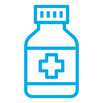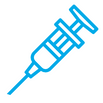Knowledge Center

Welcome to our knowledge center! Get ready to immerse yourself in a wealth of knowledge featuring an abundance of FAQs, case studies, industry expert-led videos, and cutting-edge scientific papers to gain a deeper understanding of medication adherence and why it matters in clinical trials.

Webinars
Click the icon to visit our library of recorded medication adherence webinars with industry experts.
Scientific Papers
Click the icon to visit our library of peer reviewed scientific papers that we have co-authored.
FAQ's
Click the icon to visit our library of frequently asked questions relating to adherence in trials.
Case Studies
Click the icon visit our library of studies showcasing our experience in clinical trials.
Blog
Click the icon to read our medication adherence expert's latest musings on the topic.
Dosing History DB
Click the icon to search our dosing database to learn about our experience in therapeutic areas.

KNOWLEDGE CENTER
On-Demand Webinars
If you want to level up your medication adherence strategy, you won't miss our upcoming webinars. Our team of experts will be sharing their insights and strategies for success. And if you can't make it to the live events, don't worry - we'll have recordings available to watch at your leisure. These webinars aren't your regular webinars - they're all about practical, actionable advice that you can put to use right away. So if you're ready to take your adherence strategy to the next level, join us for our upcoming webinars and see what you can achieve.
Managing the uncertainty in treatment exposure to increase success in clinical trials
Rakhi Kilaru, Executive Director of Statistical Science at Thermo Fisher Scientific; Bruce Binkowitz, PhD Vice President of Biometrics at Arcutis Biotherapeutics, Inc; Richard C. Zink, PhD Principal Research Fellow at JMP Statistical Discovery LLC; Bernard Vrijens, PhD CEO and Scientific Lead at AARDEX Group
Optimising the treatment of obesity with GLP-1. Balancing efficacy, cost and compliance
Mikael Hiligsmann, Doctor of Philosophy Maastricht University, Sean Lawley, Doctor of Philosophy University of Utah, Bernard Vriens, Doctor of Philosophy, AARDEX Group and University of Liège
The Myth of Perfect Medication Adherence in Oncology Trials
Lina Eliasson, Sprout Health Solutions , Bernard Vrijens, AARDEX Group, and Thomas Podsadecki, Development and Regulatory Affairs
Mitigating the Risk of Poor Adherence to Injectable Drugs in Hybrid & DCTs
Rebecca Beck, BD, Bernard Vrijens, AARDEX Group, and Arnaud Guillet, Biocorp
The Pill Count Controversy: Why Counting on Accountability is not Enough for Measuring Adherence in Clinical Trials
Job Van Boven, Associate Professor, University Medical Center Groningen, and Bernard Vrijens, Scientific Lead, AARDEX Group
Merck & Biogen: Mitigating the Risk of Poor Adherence in Clinical Trials
With Matt Bolton of Merck and Ning Yu of Biogen
Can Modern Medication Adherence Tools Drive Patient Compliance?
With Ken Kaitin, TUFTS, John Musaus, Thermo Fisher and Timothy Peters-Strickland, PPD

KNOWLEDGE CENTER
Scientific Papers
Our team of medication adherence specialists frequently contribute to peer-reviewed papers. If you're unable to find a particular paper listed below, you can search for and access papers from the MEMS Bibliography, a comprehensive collection of peer-reviewed papers that report study findings where dosing histories were tracked using AARDEX Group's solutions.
Correlation Between Objective Habit Metrics and Objective Medication Adherence: Retrospective Study of 15,818 Participants From Clinical Studies
Antoine Pironet
Poor Medication Adherence in Clinical Trials: Consequences and Solutions
Alasdair Breckenridge, Jeffrey K Aronson, Terrence F Blaschke, Dan Hartman, Carl C Peck, Bernard Vrijens
Adherence to Medications: Insights Arising from Studies on the Unreliable Link Between Prescribed and Actual Drug Dosing Histories
Terrence F. Blaschke, Lars Osterberg, Bernard Vrijens, John Urquhart
How the EMERGE Guideline on Medication Adherence Can Improve the Quality of Clinical Trials
Lina Eliasson, Sarah Clifford, Amy Mulick, Christina Jackson, Bernard Vrijens
ASK THE EXPERT
Schedule Meeting with our Adherence Expert
Having co-authored over one hundred peer reviewed papers alongside mentoring trial sponsors on medication adherence, our Scientific Lead, Bernard Vrijens, is considered an expert in the field.

Medication Adherence Software →
Learn about our industry-leading adherence software for trials.

Medication Adherence Packaging →
Discover our range of medication adherence packaging.

Discover our range of medication adherence devices.
Got Questions?
Connect with an adherence expert.

KNOWLEDGE CENTER
Case Studies
AARDEX Group has a proven track record of providing technology solutions that help clinical trial sponsors improve medication adherence in their trials. In fact, our technology has been utilized in more than 1,000 clinical trials to date.Our case studies provide detailed examples of how we have assisted other clinical trial sponsors in reducing the likelihood of poor adherence, resulting in more accurate data, streamlined processes, and successful trials.
How AARDEX Group Helped IROKO Pharma Gain FDA Approval
Year of Publication: 2022
Harnessing Smart Pill Bottles to Improve Patient Adherence in Trials
Year of Publication: 2022

KNOWLEDGE CENTER
Frequently Asked Questions
Given our extensive experience in the medication adherence field since 1984, it's safe to say that we've acquired a vast amount of knowledge on the topic. Listed below are the most commonly asked questions we receive, along with their respective answers.
MEMS – it may sound like just another acronym, but in the world of clinical trials, it’s so much more. MEMS stands for Medication Event Monitoring System, a revolutionary technology transforming how medication adherence is monitored in clinical trials. With AARDEX Group’s MEMS technology, researchers now have access to an open ecosystem of medication adherence packaging and devices that seamlessly integrate with the industry-leading medication adherence software, MEMS AS. This powerful combination allows for real-time, objective data on medication-taking behavior, providing researchers with the insights they need to optimize treatment plans and dosages. But it’s not just about data – it’s about making a real impact on people’s lives. By leveraging the power of MEMS, researchers can gain a deeper understanding of medication adherence, helping to ensure that patients are getting the treatment they need to live their best lives. And with AARDEX Group‘s unwavering commitment to innovation, the future of medication adherence monitoring looks brighter than ever.
There is strong evidence supporting the use of MEMS (Medication Event Monitoring System) technology in medication adherence monitoring. MEMS technology involves the use of electronic monitors embedded in medication packaging that record the date and time a patient opens the container to take medication.
Numerous studies have demonstrated the accuracy and effectiveness of MEMS in medication adherence monitoring. For example, a systematic review of 25 studies found that MEMS was highly accurate in detecting medication adherence, with a median adherence rate of 81% across all studies.
Another study found that the use of MEMS technology significantly improved medication adherence rates in patients with HIV, leading to better treatment outcomes.
Furthermore, a meta-analysis of 17 randomized controlled trials found that the use of electronic monitoring devices like MEMS was associated with a significant improvement in medication adherence compared to standard care.
Overall, the evidence strongly supports the use of MEMS technology in medication adherence monitoring. With its high accuracy and effectiveness, MEMS can help improve patient outcomes and drive new insights in medical research.
Using a digital medication adherence solution in clinical trials has several benefits. Here are some of the key reasons:
Improved accuracy: Digital medication adherence solutions are more accurate than traditional methods such as self-reporting or pill counting. These solutions can track medication adherence in real time, providing precise and reliable data that can inform safety and efficacy calculations.
Increased efficiency: Digital medication adherence solutions can automate the process of monitoring medication adherence, saving time and resources for both participants and researchers. This can lead to more efficient clinical trials and ultimately accelerate the development of new treatments.
Better patient engagement: Digital medication adherence solutions can help engage participants in their medication regimen, providing them with real-time feedback and coaching. This can help improve medication adherence rates and ultimately improve patient outcomes.
Enhanced data collection: Digital medication adherence solutions can collect a wealth of data on medication adherence patterns, providing valuable insights that can inform future research. This can help researchers identify trends and patterns in medication adherence, leading to better-informed decisions in the development of new treatments.
Increased flexibility: Digital medication adherence solutions can be used across a range of medication types and delivery methods, providing a flexible and scalable solution for clinical trials. This can help ensure that medication adherence is
Poor medication adherence can significantly impact safety and efficacy calculations in clinical trials. Inaccurate safety and efficacy calculations can lead to inconclusive or misleading results, which can have severe consequences for patients.
When participants in a clinical trial do not adhere to their medication regimen as prescribed, it can affect the accuracy and reliability of the data collected. Non-adherence can lead to under-dosing or over-dosing, affecting the safety and efficacy of the medication being tested.
In terms of safety calculations, non-adherence can make it challenging to detect adverse events that may be related to the medication being tested. This can result in safety issues being overlooked or underestimated, which can harm patients.
In terms of efficacy calculations, non-adherence can make it challenging to accurately assess the effectiveness of the medication being tested. When participants do not take their medication as prescribed, the dosage levels may not be sufficient to achieve the desired therapeutic effect. This can lead to inaccurate efficacy calculations, undermining the validity of the trial results.
